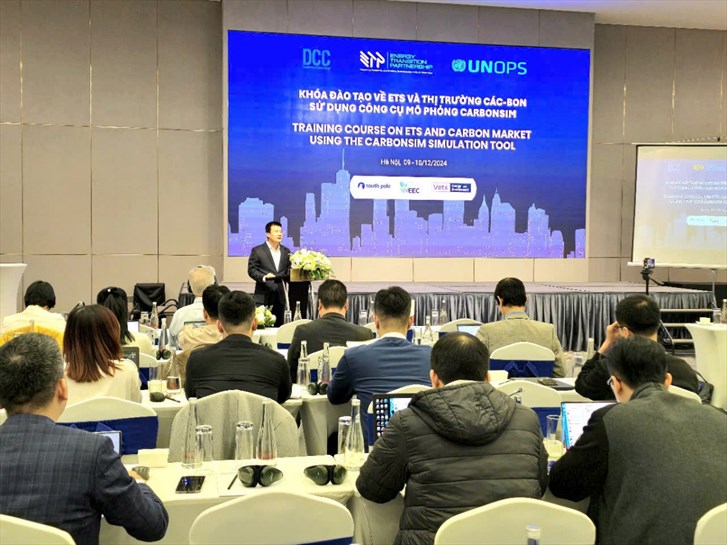Steel, thermal power enterprises participate in training course on ETS and carbon market
From December 9-10, in Hanoi, 60 enterprises in the North participated in a training course on the Emission Trading System (ETS) and carbon market using the CarbonSim simulation tool.
10/12/2024 23:19
With support from the Southeast Asia Energy Transition Partnership (ETP), two training sessions on the Emissions Trading System (ETS) and the carbon market will be organized for steel, cement, and thermal power enterprises. These sessions will take place in Hanoi on December 9-10, 2024, and in Ho Chi Minh City on December 12-13, 2024.
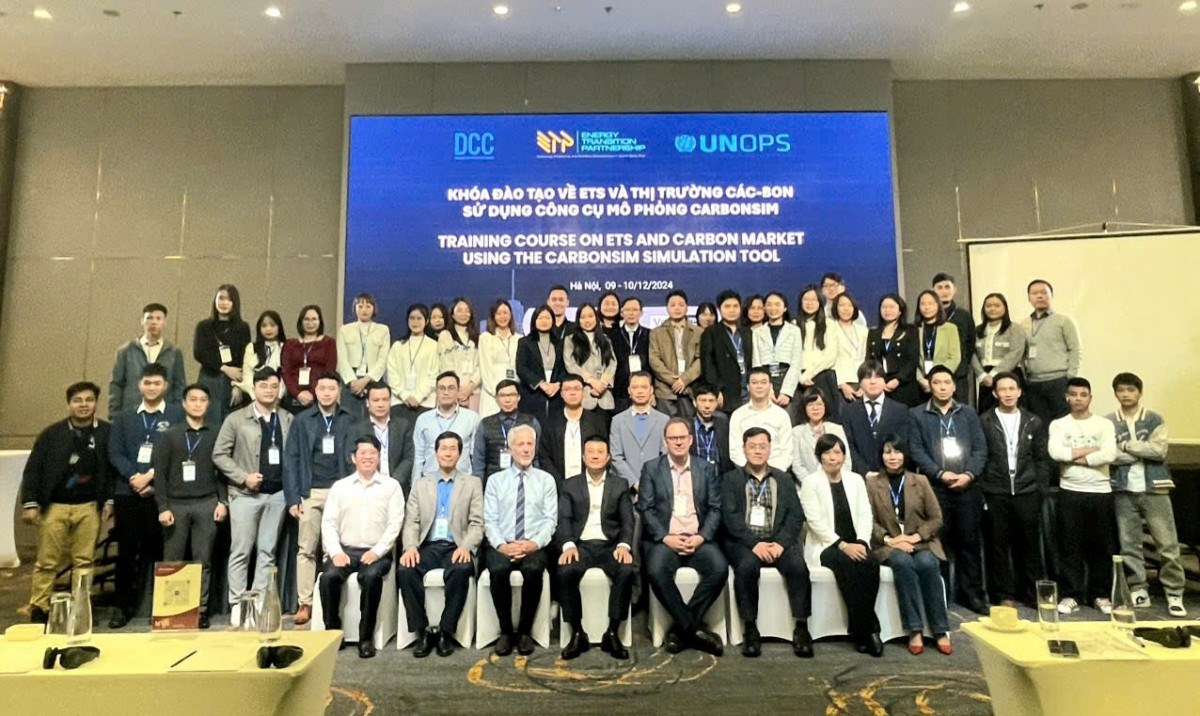 Experts and trainees participate in training on carbon market and ETS for steel, thermal power and cement enterprises in Hanoi (Photo: Thu Huong)
Experts and trainees participate in training on carbon market and ETS for steel, thermal power and cement enterprises in Hanoi (Photo: Thu Huong)
These training courses are part of ETP's support to promote the implementation of carbon markets in Vietnam in collaboration with the Department of Climate Change, Ministry of Natural Resources and Environment. Emitters will fulfill their obligations to report greenhouse gas (GHG) inventories and reduce GHG emissions. Some industries such as cement, steel production and thermal power are expected to participate in the ETS - as the main target of this training.
This is the first capacity-building activity in Vietnam that engages stakeholders from both the public and private sectors with a comprehensive and systematic training program on ETS and carbon markets combined with the use of market simulation tools. The lectures were developed and presented by leading international experts in climate change mitigation and carbon pricing. The training courses initiative comes at a crucial time when Vietnam commits to reducing GHG emissions in accordance with its obligations under the Paris Agreement.
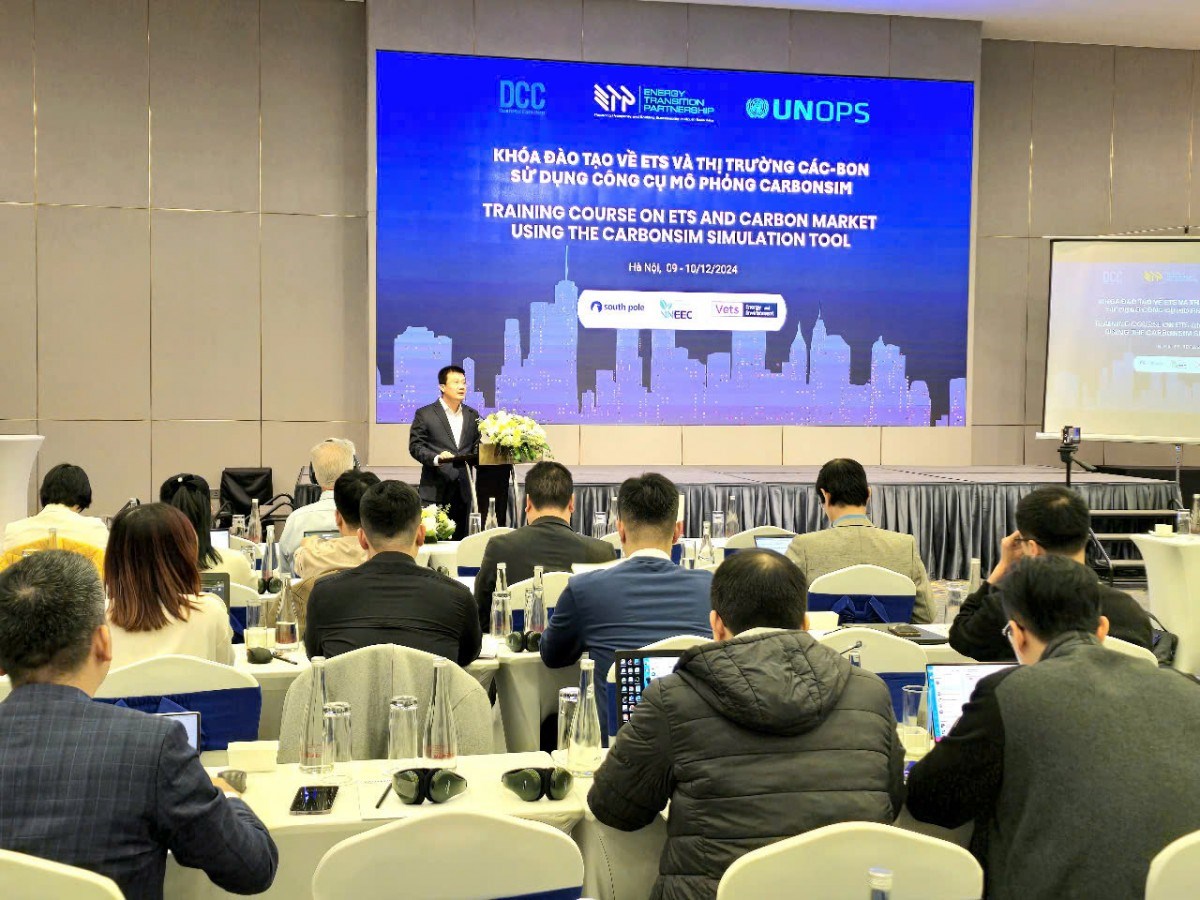 Steel, thermal power, and cement enterprises participate in training course on ETS and carbon market using the CarbonSim simulation tool
Steel, thermal power, and cement enterprises participate in training course on ETS and carbon market using the CarbonSim simulation tool
To voluntarily reduce GHG emissions by 15.8% and reduce GHG emissions by 43.5% with international support compared to the conventional emissions scenario by 2030, building an effective ETS plays a key role in achieving the target in the Nationally Determined Contribution (NDC).
By setting a cap on total emissions and allowing businesses to buy and sell allowances, ETS creates economic incentives that help enterprises find solutions to effectively reduce their GHG emissions. In addition, the revenue from the allowance auction can be reinvested in climate-related projects, further supporting the country's efforts in the fight against climate change. Therefore, the main objective of the technical assistance (TA) program is to develop and organize ETS training courses for various stakeholders including policymakers, research institutes, universities, financial institutions, media representatives, and especially big emitters who will have to participate in Viet Nam's ETS in the future.
Speaking at the event, Mr. Nguyen Tuan Quang - Deputy Director of the Department of Climate Change, Ministry of Natural Resources and Environment - said: Establishing and developing a carbon market is one of the major policies of the Party and State, which is specified in the Law on Environmental Protection 2020 (LEP 2020) and documents guiding the implementation of the law. In particular, developing a carbon market is one of the solutions to reduce GHG emissions and achieve the goal of carbon neutrality by 2050 according to the commitment of the Vietnamese Government at COP 26.
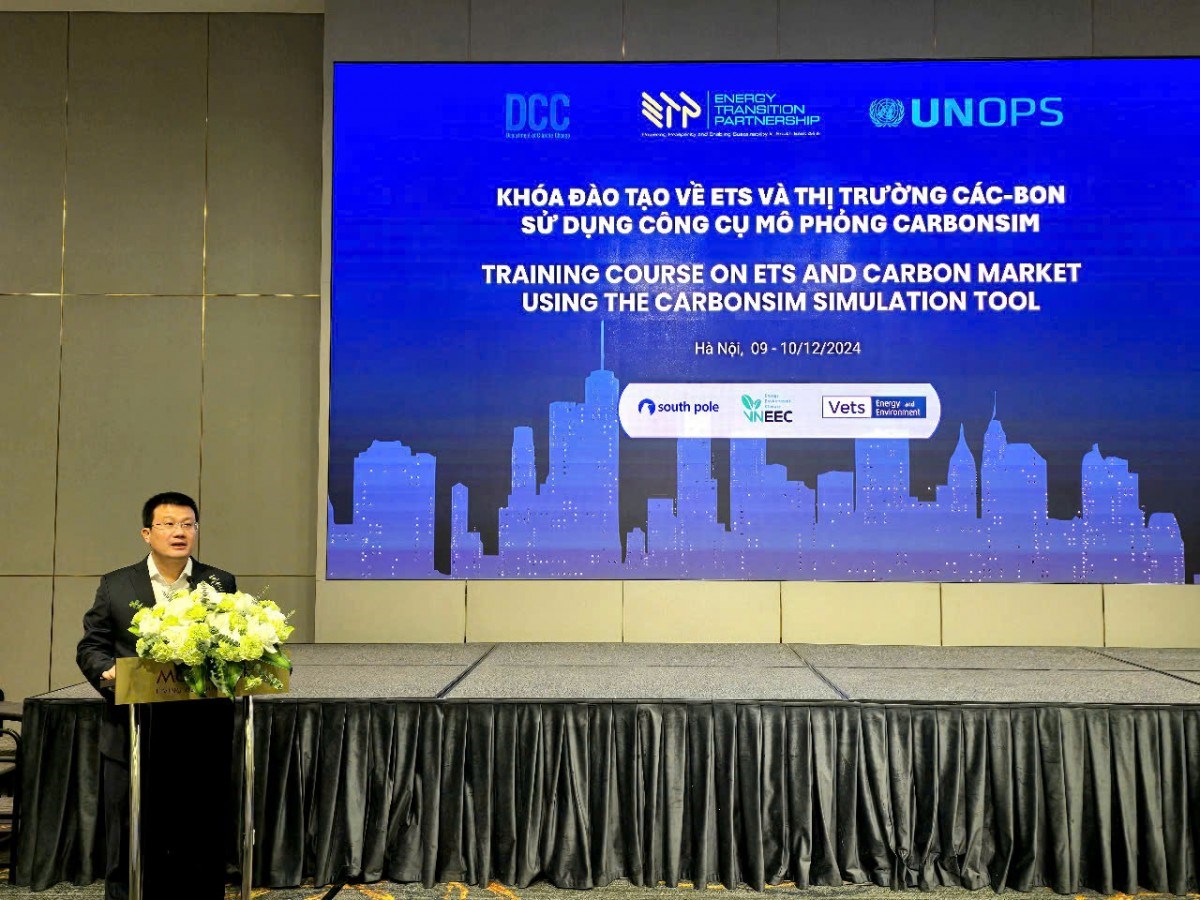 Mr. Nguyen Tuan Quang speaks at the training course (Photo: Thu Huong)
Mr. Nguyen Tuan Quang speaks at the training course (Photo: Thu Huong)
According to Mr. Nguyen Tuan Quang, reducing GHG emissions requires transitioning the economy from "brown" to "green." This involves shifting from fossil fuels to clean and
renewable energy; adopting tools and technical measures to use resources such as water, electricity, and energy more efficiently and effectively; developing forest ecosystems—which are considered one of the key solutions for carbon absorption; and capturing and storing carbon in decommissioned oil and gas fields.
Currently, global GHG emissions are estimated to exceed 51 billion tons of CO2. Commonly applied carbon pricing instruments include carbon taxes, ETS, and carbon credit mechanisms. To date, approximately 90 countries and territories around the world have implemented around 110 carbon pricing instruments. In 2024 alone, these instruments have regulated over 12.8 billion tons of CO2 equivalent, accounting for 24% of total global GHG emissions.
According to Decree No. 06/2022/ND-CP (Decree No. 06), in 2025, Vietnam will pilot the carbon market and the official market will operate in 2028 and connect to the world carbon market. "Thus, we still have very little time, to operate for the carbon market, in addition to the responsibility of state management agencies, there is also the responsibility of enterprises and this is also an opportunity for them" – Mr. Quang emphasized.
It is reported that the (MONRE), in collaboration with the Ministry of Finance (MOF), has submitted to the Government a Proposal for the establishment of a carbon market. MONRE has also advised the Government to amend Decree No. 06 to include regulations on operating carbon credit trading platforms, calculating allowances, and allocating allowances. Initially, allowances will be allocated to facilities under Decision No. 13/2024/QĐ-TTg of the Prime Minister, which updates the list of sectors and facilities required to conduct GHG inventories. These include sectors such as thermal power, steel, and cement.
"Enterprises need to make specific preparations so that when regulations on the carbon market are issued, they can participate in the market immediately," Mr. Quang advised.
The training course on ETS and the carbon market using the Carbonsim simulation tool provides an opportunity for experts to present and introduce the simulation tool, as well as to conduct training on its application for simulating ETS.
Mr. Quang emphasized that this is a great opportunity for enterprises to gain knowledge about the processes, management, and trading of carbon credits from leading global and Vietnamese experts in the carbon market field.
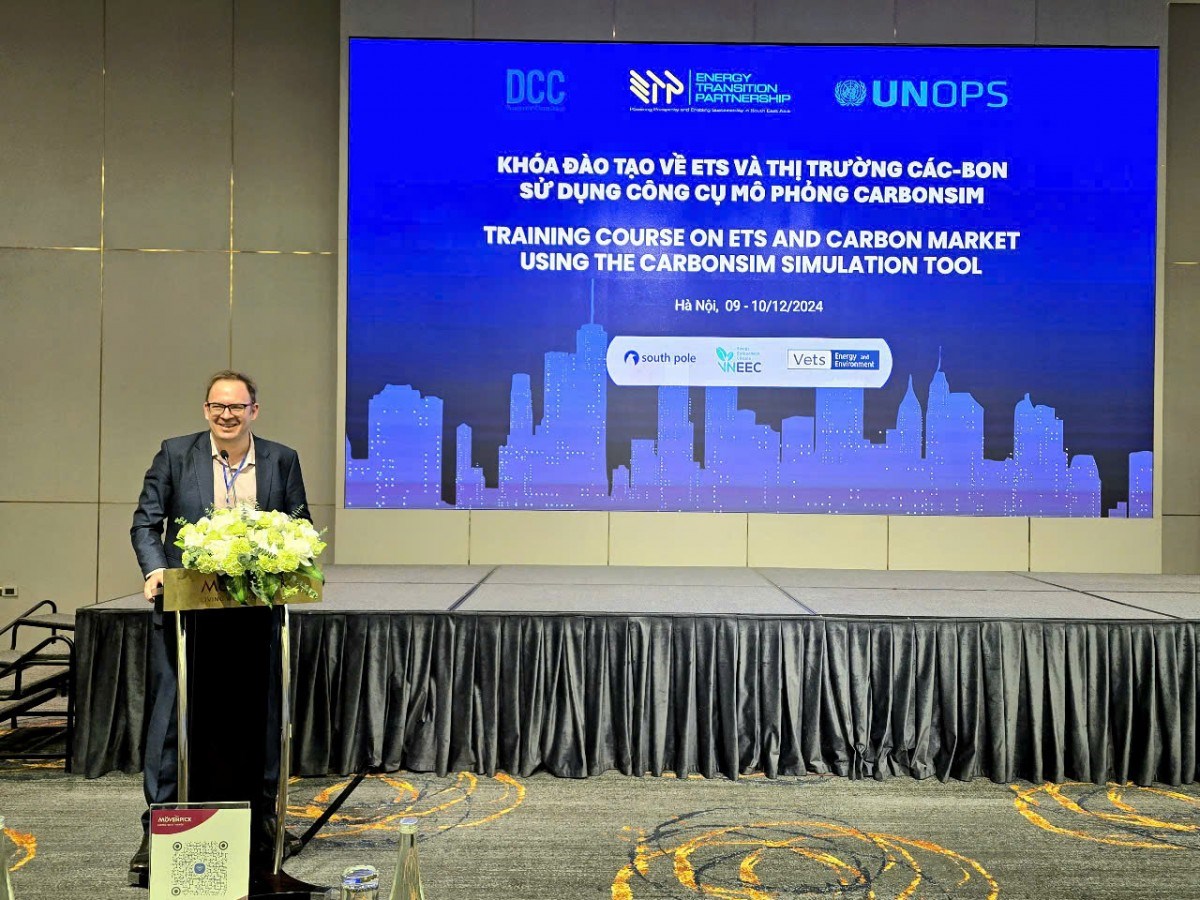 Mr. John Robert Cotton, Senior Programme Manager for ETP at the United Nations Office for Project Services (UNOPS) - Photo: Thu Huong
Mr. John Robert Cotton, Senior Programme Manager for ETP at the United Nations Office for Project Services (UNOPS) - Photo: Thu Huong
John Robert Cotton, Senior Program Manager of ETP, shared that the ETP program has supported many countries in implementing and strategizing carbon removal, helping them develop plans and frameworks for energy transition. For Vietnam, this process is facilitated by the Government's commitment to achieving carbon neutrality by 2050 and the issuance of policies and regulations on emissions reduction.
"Carbon markets are merely a tool for enterprises to calculate costs in their production and business activities effectively while still meeting the emissions reduction targets set by the government," said Mr. John Robert Cotton.
Speaking about the training course, Ms. Dang Hong Hanh - Team Leader, Climate Change Policy Expert, Co-Founder, and Managing Director of Energy and Environment Consulting Joint Stock Company (VNEEC) stated: "The target audience for both training courses this time focuses on big carbon-emitting enterprises in the industrial sectors of steel, cement, and thermal power.
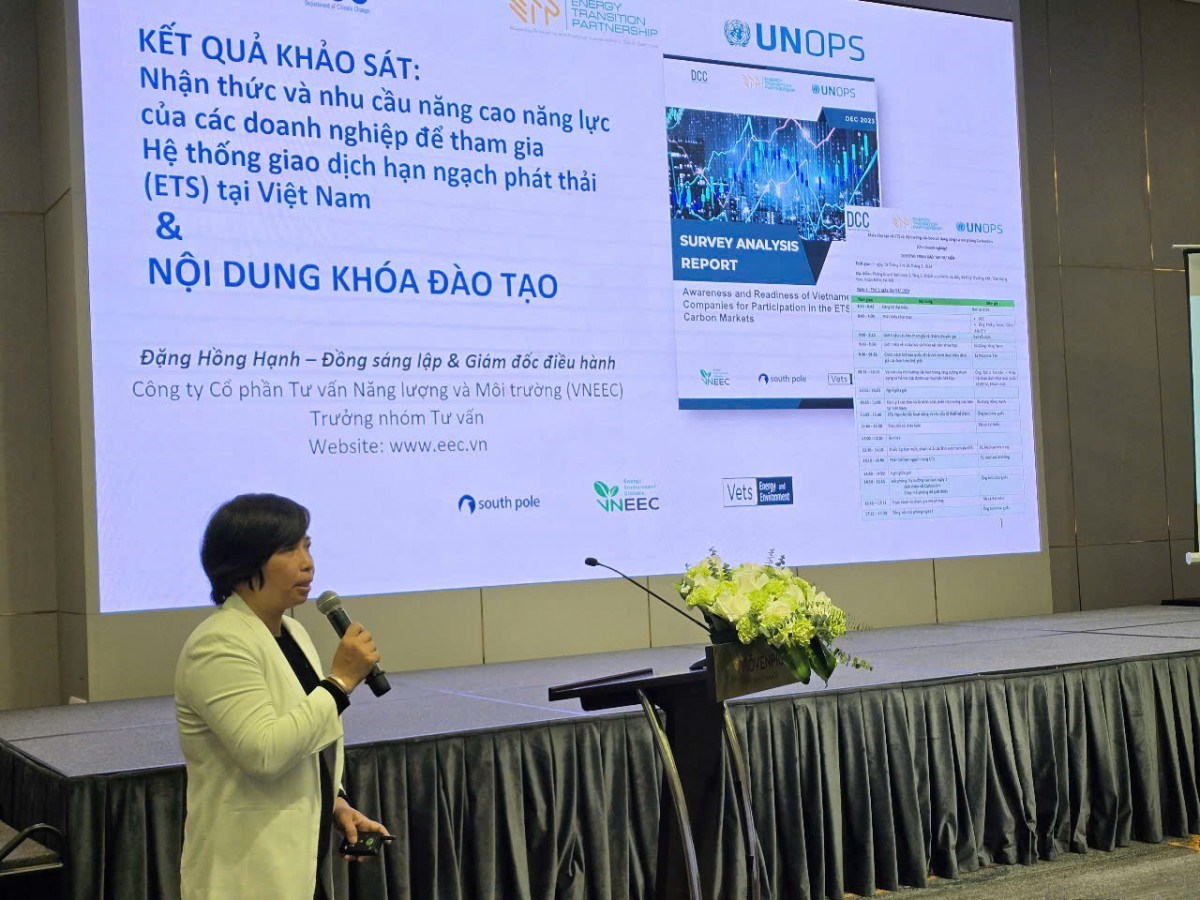 Ms. Dang Hong Hanh, Team Leader, Climate Change Policy Expert, Co-Founder, and Managing Director of VNEEC (Photo: Thu Huong)
Ms. Dang Hong Hanh, Team Leader, Climate Change Policy Expert, Co-Founder, and Managing Director of VNEEC (Photo: Thu Huong)
"For each training course we accept registration for no more than 60 students, this is to ensure that the training is of high quality and efficiency. Participants have the opportunity to participate in real-world carbon market simulations and improve their understanding of ETS's operating principles," Ms. Hanh affirmed.
The training courses also feature lectures and discussion sessions led by international experts. These sessions cover topics such as the global implementation of carbon pricing, necessary preparations for operating carbon markets, principles of ETS (cap setting, quota allocation, simulation practices, credit mechanisms, market monitoring, etc.), and the requirements for measurement, reporting, and verification (MRV) in ETS.
Previously, 04 training courses were successfully organized in March and May 2024 in Hanoi and Ho Chi Minh City, catering to both the public and private sectors.
The training courses were conducted in a hybrid format, with in-person sessions for participants and online sessions for certain international delegates and speakers. The key speakers included:
Ms. Dang Hong Hanh, Team Leader, Climate Change Policy Expert, Co-Founder, and Managing Director of VNEEC
Dr. Michael Mehling, Associate Director of the Center for Energy and Environmental Policy Research (CEEPR) at the Massachusetts Institute of Technology (MIT)
Mr. Josh Margolis, Environmental Markets Expert and CarbonSim Administrator, Formerly Managing Director at EDF
Ms. Karolien Casaer-Diez, South Pole's Regional Director Climate Policy, Finance & Carbon Markets - Asia
Ms. Roxanne Tan, Senior Climate Policy, Finance, and Carbon Markets Manager at South Pole
Mr. Victor Escalona, Associate Director - Climate Policy, Finance and Markets at South Pole
Thu Hường (congthuong.vn)








